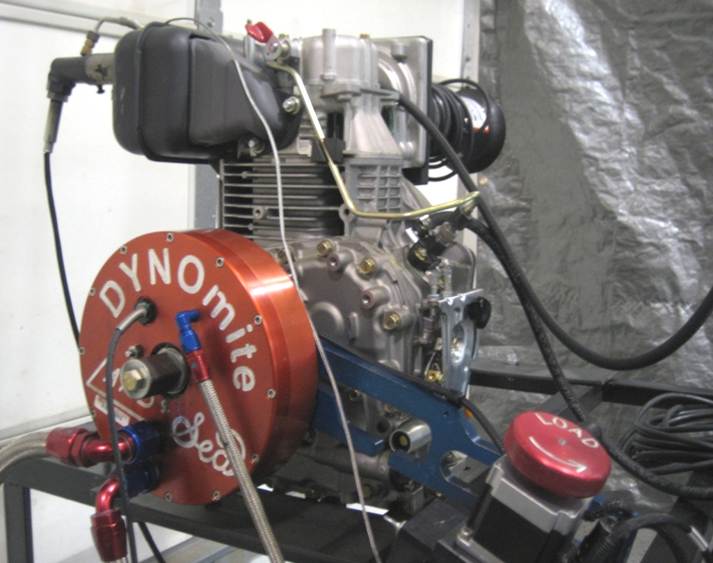Researchers Find Low-Cost Way to Reduce Emissions in Older Off-Road Farm and Industrial Equipment

University of Arkansas researchers used biodiesel fuel plus water and an emulsifier in this test engine to determine the emissions and efficiency of the fuel.
Follow the University of Arkansas on Twitter @uarkansas
FAYETTEVILLE, Ark. – University of Arkansas researchers have found a low-cost way to lower hazardous nitrogen oxide emissions in off-road diesel equipment manufactured before the advent of more stringent emissions regulations. Just add water to biodiesel, plus a little bit more.
Donald M. Johnson and Don W. Edgar, professors of agricultural and extension education, and former graduate assistant Jason A. Davis realized that traditional biodiesel fuel decreases all emissions regulated by the Environmental Protection Agency with the possible exception of nitrogen oxides. Nitrogen oxides pose a threat to human health, besides polluting the atmosphere. While the the EPA does regulate off-road diesel engines, which are found in generators, irrigation lift pumps and other industrial and farm equipment, engines manufactured before these regulations went into effect still contribute to air pollution. There are about six million of these diesel engines in use right now, and the EPA estimates that most will be in use until about 2030.
The researchers wanted to see if they could encourage people to switch to using biodiesel fuel, which comes from renewable sources such as beef tallow and soybeans. For people to make the change the fuel would have to perform just as well as regular diesel fuel and be inexpensive to use. Reduced nitrogen oxide emissions would be an added bonus.
The researchers decided to try adding water to biodiesel fuel. In addition to water, they added an emulsifier, which helps the water and biodiesel mix in much the same way creamer mixes with coffee. They found that using 10 percent water, 86.5 percent biodiesel and 3.5 percent emulsifier not only reduced nitrogen oxide emissions in off-road diesel engines, but the engines also ran better on the biodiesel mixture than on 100 percent biodiesel.
“In the tests that we’ve run, the nitrogen oxide emissions would meet the EPA standards and are lower than with petroleum diesel,” Johnson said.
For this project, the researchers used biodiesel made from a mixture of 85 percent beef tallow and 15 percent corn oil from FutureFuel in Batesville, Ark. The next steps will be to look at different percentages of water to fuel, and also to try different types of engines.
“Engines perform differently,” Edgar said. “Each has its own unique fuel performance characteristics.”
Financial support for the research was provided by FutureFuel, the Arkansas Soybean Promotion Board, and the University of Arkansas System’s Division of Agriculture.
Topics
Contacts
Donald M. Johnson, professor, agricultural and extension education
Dale Bumpers College of Agricultural, Food and Lif
479-575-2035,
dmjohnso@uark.edu
Don W. Edgar, assistant professor, agricultural and extension ed
Dale Bumpers College of Agricultural, Food and Lif
479-575-2035,
dedgar@uark.edu
Melissa Blouin, director of science and research communication
University Relations
479-575-3033,
blouin@uark.edu
Headlines
Four Students Named Goldwater Scholars; Two Earn Udall Honorable Mentions
Four U of A students have received the prestigious Goldwater Scholarship, an award for top students in mathematics, science, and engineering.
Cross-Campus Collaboration Culminates in New Outdoor Geological Installation
Grand opening event to celebrate the new GeoLab installation at the U of A’s Gearhart Hall courtyard is set for May 3. The installation will be open to the public year-round.
First Students to Use Online Degree to Hone Nursing Leadership, Elevate Patient Care
Hanna Baxendale and Wendi Kimbrell will begin coursework in the Doctor of Nursing Practice-Executive Master of Business Administration program offered by the Eleanor Mann School of Nursing and Walton College.
Join the Office for Sustainability on a Final Cruise to Campus
Cruise to Campus Wednesdays have fostered a gathering space for individuals interested in biking to campus. Drop by the Old Main Lawn from 7:30-10 a.m. Wednesday for coffee, something to eat and conversation.
Fay Jones School Student Ambassador Program Gives Voice to Design Students
The student ambassador program at the Fay Jones School of Architecture and Design is built to connect top design students with their school, its alumni, its future students and others inside and outside the school.




